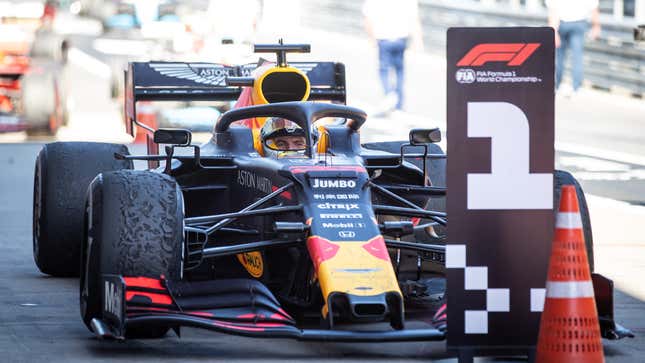
For the past three Formula One race weekends, the talk after the grand prix has been more about the stewards than the racing itself—something any viewer, no matter the sport, knows is a miserable outcome. But the full conversation about the Austrian Grand Prix didn’t even begin until more than three hours after the race on Sunday, since that’s how long it took the stewards to deliver a penalty decision.
Of course, they had their reasons.
The move in question in Austria was for the victory, since the stewards placed provisional winner Max Verstappen under investigation for a late-race move he made on leader Charles Leclerc. The move came when Verstappen took a wide route around an apex, shown in the video below, pushing Leclerc off track to take his lead and eventually win.
The investigation was major, since Leclerc crossed the line 2.7 seconds behind Verstappen and the F1 sporting regulations line out minimum penalties of five seconds under the “Incidents During the Race” section.
The stewards finally ruled, hours after the race, that Verstappen wouldn’t be penalized and would keep the win, and Motorsport.com asked F1 race director Michael Masi afterward what took so long to come to that conclusion.
Here’s what he said, via Motorsport.com:
“The primary part was we didn’t get going [with the stewards’ hearing] until 6pm, [because of] the various media commitments, the [television] pen and the post-race press conference,” said Masi. “The hearing itself, give or take, was about an hour with all parties involved.
“The stewards deliberated, looked at other cases, precedents, and spoke between themselves. [...]”
Masi also told Motorsport.com that the group had to write the decision, “make sure there [were] no typos or anything in it and so forth,” and then call teams back in to tell them the result, which takes a lot of time. After all, the stewards wouldn’t want to announce that Matt Verstappen won the race, because people wouldn’t have any idea who to look for, like announcing a contest winner only by their last name at a family reunion or something.
Despite Masi telling Motorsport.com stewards needed to consider “absolutely everything” before deciding, taking so much time just called more attention to the argument of whether F1 is over officiating, and likely soured some of the experiences of people in the stands. No one wants to spend a drive home from the track refreshing their phone feed for a decision about who actually won the race they just paid to see, especially after seeing a wild late pass for the win and after the past two race weekends have been marred with penalty discussions.
The issue is less about the stewards and more about rules and precedents that have been set in these situations in F1, and whether they should be reevaluated. Investigating a move some would consider no more than dirty, with the winner on the line, almost seems trivial by the time the decision comes out.
Like Leclerc’s own teammate Sebastian Vettel said in a post-race TV interview, F1 drivers are “all adults” at the top of their discipline and probably don’t need someone analyzing their every move—especially when what goes around often comes around in motorsports. (Vettel, for the record, said he hadn’t yet seen the move yet, and was on the receiving end of a penalty in Canada.)
But rules are rules, until someone comes in and changes them—no matter how controversial or time consuming.